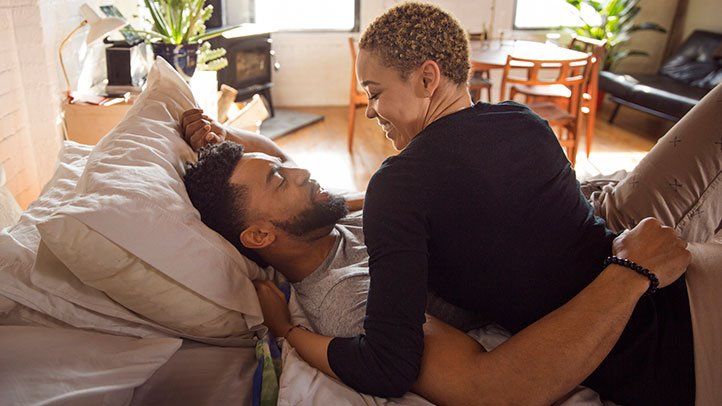Lifestyle
‘I’m A Sex Therapist, These Are The 3 Most Common Sex Issues.
Published
5 years agoon
By
Adubianews
By: GWEN BUTLER
For many people, sex is the place where a lot of tension shows itself. For example, a couple who is fighting over finances might see that conflict play out through a lack of intimacy in their sexuality together. I became increasingly curious about this and other similar dynamics, and as I have a relative ease in talking about sex and sexuality issues, I decided to pursue it as a certified sex therapist.
My own sexual openness has been an evolution, which was also one of the reasons I went into this important work. I was raised in a relatively closed and rigid religion and culture, where there was a lot of shame connected to sex and sexuality. I experienced cognitive dissonance around sex; how could this thing I want so badly, be so bad? I had to process through that shame for myself. I call it the “un-shaming process” when I work through it with some of my clients today. Many people miss out on their sexuality, in fear of exploring pleasure because they are entangled in this shame.
In my practice as a sex therapist, I typically see a lot of cisgender women, people of color and heterosexual couples. I am also a counselor and adjunct professor at Adelphi University on Long Island, which is great, because it places me strategically with college students who are actively learning about themselves sexually. A lot of the issues across the populations I see are surprisingly common; there are three areas in particular I encounter the most.
1. Desire discrepancy
The most common issue I see is desire discrepancy between couples. This is where one person in the relationship wants more sex, different sex, or simply wants to explore more sexually, and the other partner is resistant.
Currently I am treating a monogamous heterosexual couple who are dealing with this exact issue; the male partner wants to be more sexually active than the female partner. Of course, I have to look into what the underlying issues are. In this case it’s not necessarily a matter of unresolved anger or an emotional issue as in other cases. With this couple, the female partner is finding that her body is changing with age and her sexual desires have evolved. What was a turn on 10 years ago is no longer a turn on today. This opens up the space for communication, understanding, and a sense of something new—a birth of a new sexuality. It is also the place of mourning the loss of old sexuality. It’s a process that requires time, patience, and perseverance.
Particularly in relationships where monogamy is the agreement, it is important to have discussions and understanding of one another’s perspectives. One of my mentors describes that as signing up for monogamy, not celibacy. In other words, if I become vegan does the whole household become vegan? No. We just have to find a new way to eat together. It’s important to have these conversations as a couple and then look at how they can re-develop their sexuality in a way that allows them to find pleasure again, together.
2. The “COVID Cave”
Perhaps the most prevalent issue I’m seeing right now is what I’m calling the “COVID Cave.” With the pandemic many people are now working from home. If you have a partner you live with, you are seeing one another all the time now, all day long. We are typically a people of schedule, routine and structure, even as a comforting assurance of life. With this “shut-in” change to our lifestyles, there are fewer boundaries and our days have less rigid timelines. I find that people work longer hours because of the ease of working from home, however this becomes problematic when it interferes with quality time with your partner; whether that normally happens over dinner or just laying in bed together.
Previously, we were accustomed to going out for date nights and being entertained in different ways outside the home. So, people are having to be more creative. I was talking to a couple recently, who said that they had a lot more privacy at home when their kids were at school; during that time they had the opportunity to play sexually with one another. Now that their children are remote-learning they have had to find other creative ways of achieving sexual privacy. At times they will drive in their car to somewhere secluded and enjoy a little fun sexually together. They have found other ways to connect and keep it exciting for each other.
Many people are not accustomed to seeing their partners all day long and I think it’s really important to maintain a sense of mystery, which lends to relationship excitement. I absolutely encourage people to be more creative sexually and push their boundaries in a safe way. If you’re at home and you have privacy, now is a great time. A lot of my clients and even some friends, have been reaching out and asking me what the best sex toy is; they want something new to incorporate into their sex life. Now is a really good time to become creatively and better sexually acquainted with yourself. Investigate your own sexuality more deeply and discover what turns you on. Then you can bring that into your sexual relationship. I always say, your first sexual relationship is the one with yourself.
3. Sexual Anxiety
I also see a lot of general anxiety around sex and sexuality with my clients. Issues might include, for example, fear of climaxing too soon or anxiety about how to please their partner. I see a lot of “what if?” negative questions around sex. In those situations I work with the person or couple to uncover what the anxiety is, where it’s coming from and what has triggered it. Sometimes that anxiety relates to trauma, which would then require some trauma work. Sometimes the anxiety comes from shame or not having an adequate psycho-sexual education. Whatever the scenario, we work through it in talk-therapy together.
A common anxiety I see is around oral sex. When people say they “don’t like it”, I suggest we delve into the reason a little more. Oftentimes, what I find is that they are not confident in their ability to do it, or they think they’re not doing it right. But what is the right way to perform oral sex? The right way is the way your partner wants it and enjoys it! Like so many aspects of sex, there is no single one “right way”. Every individual and couple are different, and it is so important to work out what is right for you. What may work for one couple may not work for another. Therapy can be extremely useful, and sexual development is about empowering people to give themselves permission to explore and learn together.
Overall, my observation is that any changes in attitudes toward sexuality that have taken place have mostly been generational. Younger generations are typically much more progressive sexually, including openness to sexual ideas, identities, orientations and/or alternative relationships. They don’t carry the shame of generations before. Older generations tend to be more rigid in terms of monogamy and exclusivity, and can be more rigid in their sexual exploration and personal pleasure.
I have noticed that the more people overthink what’s happening sexually, the less likely they are to enjoy sex. This is what makes practicing mindfulness important. It allows you to stay in the moment, in your body; to flow with it, and just go with it. We have to find ways to slow down our thinking process and go with what feels right. Sexuality and sexual pleasure are a physical and sensual thing. And while it certainly involves emotions and mental connection, it is directly attached to what we are feeling sensually and physically.
You may like
-


NPP Communicator Blames Mahama in Interview Over Viral Video Controversy
-


NPP Unveils Nationwide Reorganisation Timetable Ahead of 2026 Internal Elections
-


MPs Demand Tougher Action as Human Trafficking Cases Rise in Ghana
-


Abu Jinapor Demands Urgent Reforms to Address Ghana’s Cocoa Sector Challenges
-


Felix Kwakye Ofosu Defends Mahama Over Cocoa Pricing Remarks, Slams NPP Criticism
-


Asiedu Nketia Uses NDC Thank You Tour to Collect Feedback on Government
-


Speaker Urges Executive to Grant Parliament Permanent Land
-


Finance Expert Warns Cocoa Reforms Could Worsen COCOBOD Debt
-


Jinapor Swears In New VRA Resettlement Trust Fund Board

















